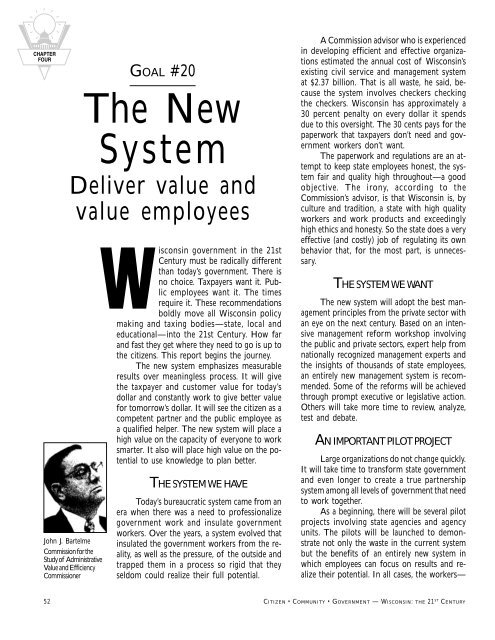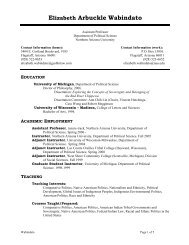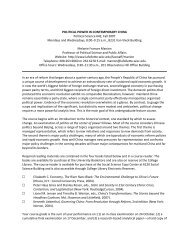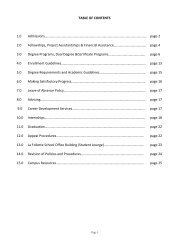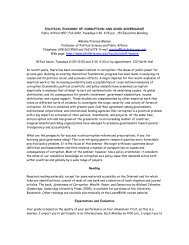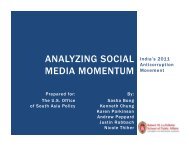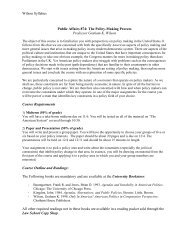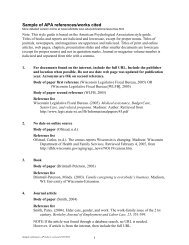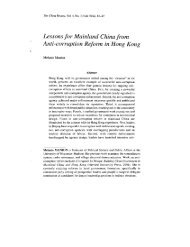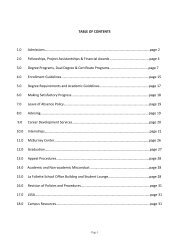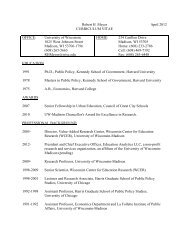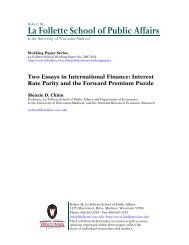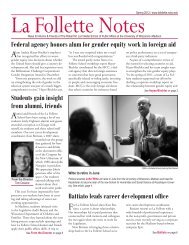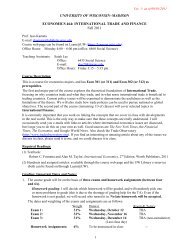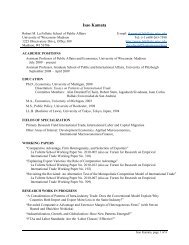SAVE Commission's findings - La Follette School of Public Affairs ...
SAVE Commission's findings - La Follette School of Public Affairs ...
SAVE Commission's findings - La Follette School of Public Affairs ...
You also want an ePaper? Increase the reach of your titles
YUMPU automatically turns print PDFs into web optimized ePapers that Google loves.
CHAPTER<br />
FOUR<br />
GOAL #20<br />
The New<br />
System<br />
Deliver value and<br />
value employees<br />
John J. Bartelme<br />
Commission for the<br />
Study <strong>of</strong> Administrative<br />
Value and Efficiency<br />
Commissioner<br />
isconsin government in the 21st<br />
Century must be radically different<br />
than today’s government. There is<br />
no choice. Taxpayers want it. <strong>Public</strong><br />
employees want it. The times<br />
require it. These recommendations<br />
boldly move all Wisconsin policy<br />
making and taxing bodies—state, local and<br />
educational—into the 21st Century. How far<br />
and fast they get where they need to go is up to<br />
the citizens. This report begins the journey.<br />
The new system emphasizes measurable<br />
results over meaningless process. It will give<br />
the taxpayer and customer value for today’s<br />
dollar and constantly work to give better value<br />
for tomorrow’s dollar. It will see the citizen as a<br />
competent partner and the public employee as<br />
a qualified helper. The new system will place a<br />
high value on the capacity <strong>of</strong> everyone to work<br />
smarter. It also will place high value on the potential<br />
to use knowledge to plan better.<br />
THE SYSTEM WE HAVE<br />
Today’s bureaucratic system came from an<br />
era when there was a need to pr<strong>of</strong>essionalize<br />
government work and insulate government<br />
workers. Over the years, a system evolved that<br />
insulated the government workers from the reality,<br />
as well as the pressure, <strong>of</strong> the outside and<br />
trapped them in a process so rigid that they<br />
seldom could realize their full potential.<br />
A Commission advisor who is experienced<br />
in developing efficient and effective organizations<br />
estimated the annual cost <strong>of</strong> Wisconsin’s<br />
existing civil service and management system<br />
at $2.37 billion. That is all waste, he said, because<br />
the system involves checkers checking<br />
the checkers. Wisconsin has approximately a<br />
30 percent penalty on every dollar it spends<br />
due to this oversight. The 30 cents pays for the<br />
paperwork that taxpayers don’t need and government<br />
workers don’t want.<br />
The paperwork and regulations are an attempt<br />
to keep state employees honest, the system<br />
fair and quality high throughout—a good<br />
objective. The irony, according to the<br />
Commission’s advisor, is that Wisconsin is, by<br />
culture and tradition, a state with high quality<br />
workers and work products and exceedingly<br />
high ethics and honesty. So the state does a very<br />
effective (and costly) job <strong>of</strong> regulating its own<br />
behavior that, for the most part, is unnecessary.<br />
THE SYSTEM WE WANT<br />
The new system will adopt the best management<br />
principles from the private sector with<br />
an eye on the next century. Based on an intensive<br />
management reform workshop involving<br />
the public and private sectors, expert help from<br />
nationally recognized management experts and<br />
the insights <strong>of</strong> thousands <strong>of</strong> state employees,<br />
an entirely new management system is recommended.<br />
Some <strong>of</strong> the reforms will be achieved<br />
through prompt executive or legislative action.<br />
Others will take more time to review, analyze,<br />
test and debate.<br />
AN IMPORTANT PILOT PROJECT<br />
<strong>La</strong>rge organizations do not change quickly.<br />
It will take time to transform state government<br />
and even longer to create a true partnership<br />
system among all levels <strong>of</strong> government that need<br />
to work together.<br />
As a beginning, there will be several pilot<br />
projects involving state agencies and agency<br />
units. The pilots will be launched to demonstrate<br />
not only the waste in the current system<br />
but the benefits <strong>of</strong> an entirely new system in<br />
which employees can focus on results and realize<br />
their potential. In all cases, the workers—<br />
52 CITIZEN • COMMUNITY • GOVERNMENT — WISCONSIN: THE 21 ST CENTURY


